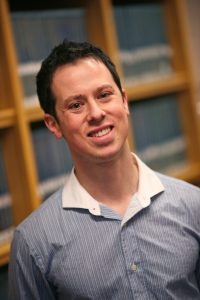
St. Paul, Minn. – Macalester Mathematics Prof. Chad Higdon-Topaz has been asked to speak at the 15th Chinese-American Kavli Frontiers of Science symposium next month. The symposium, co-sponsored by the Chinese Academy of Sciences and the U.S. National Academy of Sciences, is the Academy’s premiere activity for distinguished young scientists.
Unlike meetings that cover a single, narrow slice of science, Kavli Frontiers of Science symposia are designed to provide an overview of advances and opportunities in a wide-ranging set of disciplines and to provide an opportunity for the future leaders of science to build a network with their colleagues. The format encourages both one-on-one conversations and informal group discussions in which participants continue to communicate about insights gained from formal presentations and cutting-edge research in other fields. By doing so, Frontiers helps to remove communication barriers between fields and encourages collaborations. Attendees, who are selected by a committee of Academy members, are young researchers who have already made recognized contributions to science, including recipients of major fellowships and awards.
“The invitation to speak at this symposium is one of the highlights of my career,” said Higdon-Topaz. “I’m honored to be chosen to participate and look forward to meeting colleagues with whom I hope to work in the future.”
Since its inception in 1989, more than 150 of its “alumni” have been elected to the National Academy of Sciences, and eight have received Nobel Prizes. Many participants cite the Kavli Frontiers of Science symposium as one of the most significant experiences of their scientific careers.
The symposium is October 12-14, 2012, in Irvine, Calif.
Macalester College, founded in 1874, is a national liberal arts college with a full-time enrollment of 1,978 students. Macalester is nationally recognized for its long-standing commitment to academic excellence, internationalism, multiculturalism and civic engagement. Learn more at macalester.edu.
August 31 2012
Back to top





